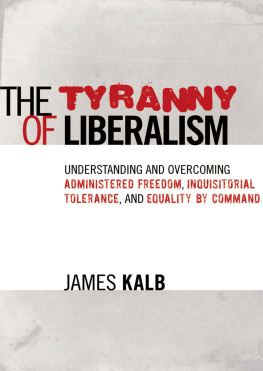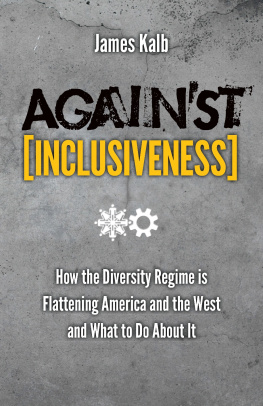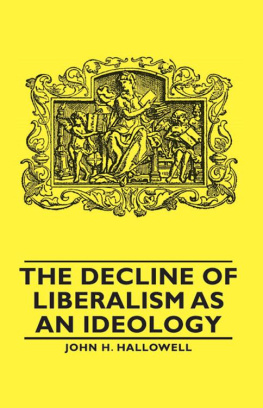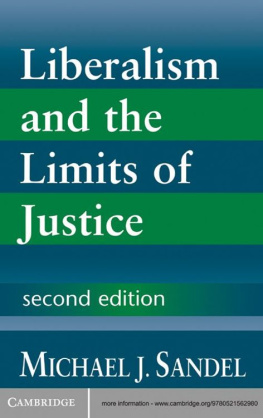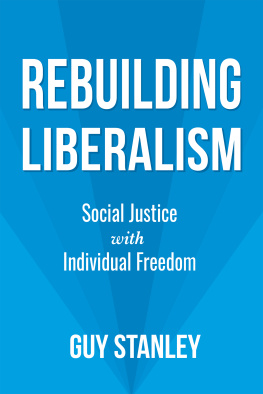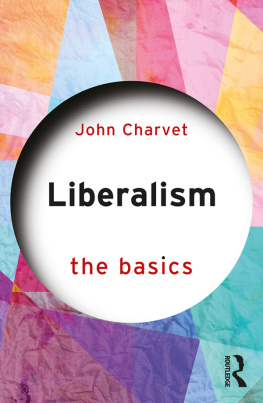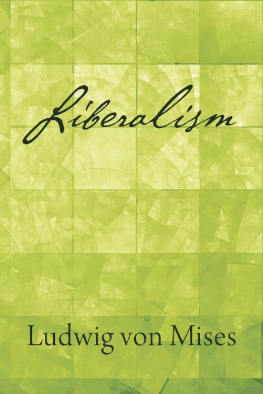The Tyranny of Liberalism

Understanding and Overcoming
Administered Freedom, Inquisitorial Tolerance,
and Equality by Command
James Kalb

Wilmington , Delaware
UXORI DILECTISSIMAE
Contents

Introduction

T HIS IS A BOOK ABOUT THE TYRANNY OF LIBERALISM: WHAT IT IS, HOW IT comes about, what its implications are, and what to do about it.
Such a theme is unusual enough to call for explanation. To many readers it will seem odd to hear of the tyranny of liberalism. After all, they will say, liberalism has always stood against tyranny, and in any event is too moderate and diverse a tendency to have any very definite consequences, let alone tyrannical ones.
Still, man is rational, at least to the extent that how he thinks has consequences. To understand human society we must be able, among other things, to talk about particular ways of thinking and to identify their effects. This book is intended as an exercise in that activity. It will be successful if it identifies a reasonably coherent and enduring tendency of thought that can be called liberalism, if it articulates liberalisms sources and tendencies, and if it draws a persuasive connection between those tendencies and basic trends in social life. We need not claim that basic tendencies of thought determine everything to claim that they exist and determine some important things.
To say there is a tyranny of liberalism is to say that a particular way of understanding political, social, and moral life, one that treats freedom, equality, and satisfaction of preferences as final standards, has become overwhelmingly dominant in serious public discussion and in the self-understanding of major institutions. That way of understanding life is closely associated with ways of thinking characteristic of the modern natural sciences, so much so that many persons take for granted that liberalism is simply equivalent to moral and political rationality. Indeed, liberalism is allied with interests and institutions that benefit from it and increasingly try to bring all social relations in line with its standards of rationality and justification.
The argument of the first half of this book is that such an approach to political, social, and moral life excludes too much. It takes an overly technological approach to social life and has no way to deal with the natural tendencies, particular connections, and higher goals that are an essential part of human existence. Liberal assumptions and ideas cause social authorities to lose touch with human reality, to supplant and suppress informal and traditional institutions such as the family, and eventually to overreach and become tyrannical, self-contradictory, and self-destructive. The common good, along with justice and liberty, demand a basically different approach. The second half of the book attempts to outline such an approach, one that makes much more room than liberalism now permits for tradition, religion, particularity, and transcendence. It includes a defense of the reasonableness of such things, and indeed of their necessity for a rational way of life.
Liberalism so surrounds us that it is hard to imagine an alternative. Even those who see difficulties with it almost never reject it fundamentally, but attempt to reinvent it in one way or another. Complaints that liberalism is not really free, equal, or democratic end not in its abandonment as misconceived and unworkable, but in proposals for some more authentic form of freedom, equality, and popular rule, and thus in a call for a more liberal liberalism. In contrast, traditionalist concerns about cultural degradation and deterioration of fine-grained social order are treated as secondary matters and handled by appeals to creativity, therapy, or ad hoc stopgaps.
Many readers are therefore likely to reject out of hand complaints about liberalism in general. In many cases their objections must be answered before the discussion can proceed in a way that makes sense to them. However, each will have his own objections, and they cannot all be dealt with first. In addition, those sympathetic to my point of view would be puzzled and bored by a presentation that starts off dealing with objections rather than giving a positive account of the matters under consideration. For the benefit of more sympathetic readers, I have laid out the discussion in the way that seems most natural to me, putting my positive account first and answering objections later. Those less sympathetic may want to change the order in which they read the book, and refer early on to sections dealing with objections they find crippling. In particular, those who want to know what specifically I mean by liberalism and why I treat it as a continuing and coherent active principle may want to refer to What is Liberalism, Transformations, and Importance of Principles in chapter 2 and Ideas Have Consequences in chapter 5. The latter chapter also deals with other objectionsfor example, claims that liberalism cannot be tyrannical because liberal government deals only with a narrow range of human concerns, or that to reject liberalism would be morally indecent.
Responses to objections can of course themselves meet with objections. In the case of a topic that has been discussed as voluminously as liberalism, the more important the point the more varied and complex the arguments are likely to have become. A comparatively short essay that covers a vast territory can hardly do more than lay out main lines of argument in the hope of initiating discussions that may be fruitful. Even that effort is likely to fall far short in the eyes of those who approach the matter with fundamentally different perspectives and commitments. Most readers of this book will (like myself) have been raised in a liberal society, surrounded by liberal influences, schooled in liberal ways of thinking, and affected by the political and social developments of recent decades. Each, then, has the basic knowledge needed to judge my descriptions and interpretations for himself. I hope that those who remain unsympathetic, while voicing whatever criticisms they think decisive, will consider whether my efforts advance discussion by clarifying and connecting a number of common objections to the understanding of political, social, and moral life now dominant. Naturally, I hope also to find sympathetic readers whose thoughts this book can clarify and systematize. It is for such readers that this book is first of all meant.
Part I
Decline and Fall

CHAPTER ONE
Liberal Tyranny


